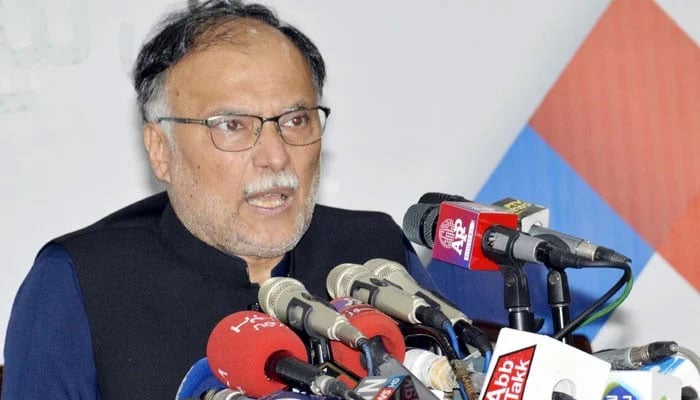Foreign Currency Accounts in commercial banks: Govt won’t touch anyone’s private money: Ahsan
ISLAMABAD /KARACHI: Federal Minister for Planning Ahsan Iqbal said Sunday the government will not touch anyone’s private money.
Speaking in Geo’s programme Naya Pakistan, hosted by Shahzad Iqbal, the minister said has said that Federal Finance Minister Ishaq Dar did not say anything objectionable (about the foreign currency accounts), as the reserves of State Bank and commercial banks have been counted in foreign exchange reserves in the past. He ruled out any default for Pakistan, and said panic and harassment should not be created. He said that Pakistan is facing challenges, which would be met jointly. He said that Pakistan is facing worst ever environmental destruction and international community has estimated flood damage in Pakistan at $30 billion.
He said that currently there is economic crisis across the world and due to this all countries are facing their internal problems. He said that he hoped that Pakistan would get $8 billion target for next three years. He said that previous government accepted conditions of IMF but did not act upon it and the sitting government has to bear the brunt of that. He said that the government has engaged IMF after completing preparations for 9th review with IMF. The planning minister said the government’s direction is right, and claimed that rupee would be stabilised in a few months.
Meanwhile, a senior official of the Ministry of Finance ruled out the possibility of any consideration of freezing the foreign currency accounts in the aftermath of the depletion of foreign exchange reserves held by the State Bank of Pakistan (SBP) that touched $4.5 billion, and stated that all such rumors were just part of the propaganda that the country was sliding towards default like situation. Finance Minister Ishaq Dar in his earlier statement argued that Pakistan’s foreign exchange reserves stood at $10 billion instead of $4.5 billion held by the SBP. He was of the view that the foreign exchange of commercial banks was also part of the country’s foreign exchange reserves.
Ishaq Dar’s statement on foreign exchange reserves of $10 billion triggered a controversy on social media whereby many raised apprehensions about the possibility of repeating the history of forex reserves which were done in the aftermath of the nuclear explosion back in 1998. The country faced economic sanctions after May 28, 1998 explosion. The country’s foreign exchange reserves had touched the lowest ebb of just standing at $414 million.
“I think his (finance minister) statement has been misunderstood. He meant to say about total reserves count,” said Alpha Beta Core CEO Khurram Schehzad.
Instead of making such statements, according to Schehzad, concrete efforts must be done to secure the required financing from bilateral and multilateral lenders.
Dar’s claim that the country’s foreign reserves currently stand at $10 billion is correct, as Pakistan’s total reserves have fallen to $10.4 billion as a result of $1.02 billion in commercial loan repayments to two foreign banks. The country had $11.4 billion in total liquid foreign reserves as of December 30.
After the latest repayments of the external debt on Friday, the State Bank of Pakistan’s reserves, or the country’s official reserves decreased to $4.5 billion. The SBP’s reserves are just enough to cover less than one month of imports. The SBP stockpile was $5.6 billion, while the foreign reserves held by commercial banks stood at $5.84 billion over the previous week.
Social media was flooded with panic as fears of default intensified amid a dollar scarcity. “Is he for real? Ishaq Dar claims that the $ deposits of citizens in commercial banks also belong to the country! No they don’t. They belong to citizens whose money it is. Unless Dar is planning to freeze $ accounts again like he did in 1998,” said Asad Umar, PTI Secretary General in a Tweet.
A major bank’s CEO, who asked to remain anonymous, told The News that because foreign currency accounts are guaranteed, the money in them is secure. The government can’t utilise it. Separate accounts are used to keep these deposits.
“An SBP circular was published, assuring depositors that their funds wouldn’t be mixed with the SBP. The finance minister should clarify what he was attempting to convey since a crucial period of time lies ahead,” he said.
The money is deposited in the bank’s Nostro accounts, which are maintained in New York, he added. “Any attempt to freeze such accounts would erode the confidence that had taken 22–23 years and significant effort to establish. That can trigger an unnecessary response from the markets,” he added. By definition, a Nostro account refers to an account that a bank holds in a foreign currency in another bank.
Under FE Circular 25, issued in June 1998, the SBP allowed the opening and free operation of new foreign currency deposit accounts by residents as well as non-residents under new rules.
Commercial banks and non-bank financial institutions (NBFs) are free to accept foreign currency deposits (or issue certificates of investment, as applicable) from any person (which term includes residents as well as non-residents, Pakistani and foreign nationals, a firm, company, and other legal entities) in any foreign currency, the circular said.
Dr Muhammad Yaqub, the former central bank’s governor said the SBP’s regulations under which commercial banks are allowed to accept foreign currency deposits specifically state that in order to meet those liabilities banks must maintain equivalent foreign currency assets in their own portfolios and not surrender those deposits to SBP to make them a part of its reserves or provide them to the government to meet their foreign exchange shortfalls.
“These provisions were incorporated in the SBP regulation based on the past experience of the government’s inability to meet short-term foreign currency liabilities due to exhaustion of those funds in meeting the structural balance of payments deficits in place of reducing them by difficult policy decisions,” Yaqub said.
Commercial banks are required by law to keep the equivalent assets matching with the structure of foreign currency deposits to meet their obligations and the SBP is not allowed to force the commercial banks to surrender those assets to the SBP or government, according to Yaqub.
Foreign currency accounts including Roshan Digital Accounts are legally protected under the Foreign Currency Accounts (Protection) Ordinance 2001, and the government and SBP are committed to protecting all the financial assets in Pakistan, according to a statement from the Finance Ministry in June.
Amid dwindling foreign exchange reserves, the country is heavily relying upon the possibility of additional deposits of $3 billion from Saudi Arabia and another $700 million to $1.2 billion re-financing of Chinese loans till the time of the revival of the stalled IMF programme.
With additional deposit from KSA and China’s re-financing, the country could pass two to three months without fear or risk of default but ultimately Islamabad will have to secure the IMF programme.
Over the next three years, Pakistan requires a $78 billion financing gap from 2023-24 to 2025-26 and so much huge financing cannot be filled without the backing and support of the IMF. Even after the expiry of the existing $7 billion Extended Fund Facility (EFF), Pakistan will have to seek a fresh IMF programme at all costs. Pakistan’s foreign exchange reserves are depleting fast as the country experiences a deepening economic crisis, but bankers and analysts ruled out the possibility of freezing foreign currency accounts because the money in these accounts is legally protected.
After Finance Minister Ishaq Dar stated in a broadcast interview that the country has $10 billion in foreign exchange reserves instead of $4 billion because $6 billion is held by commercial banks but also belongs to the country, rumours spread that the government plans to freeze or impose restrictions on withdrawals from foreign currency accounts.
-
 Hailee Steinfeld Details Preparations Ahead Of Welcoming First Kid With Josh Allen
Hailee Steinfeld Details Preparations Ahead Of Welcoming First Kid With Josh Allen -
 Shocking Details Revealed About Gunman 'Austin Tucker' Shot Dead At Trump’s Resort 'Mar-a-Lago'
Shocking Details Revealed About Gunman 'Austin Tucker' Shot Dead At Trump’s Resort 'Mar-a-Lago' -
 Queen Camilla Meets Gisèle Pelicot, Sends Powerful Message To Victims As Andrew's Scandal Deepens
Queen Camilla Meets Gisèle Pelicot, Sends Powerful Message To Victims As Andrew's Scandal Deepens -
 Cancer-stricken King Charles At Breaking Point?
Cancer-stricken King Charles At Breaking Point? -
 Andrew Leaves King Charles No More Moves To Play: ‘Can’t Just Say We Got Nothing’
Andrew Leaves King Charles No More Moves To Play: ‘Can’t Just Say We Got Nothing’ -
 Sterling K. Brown Explains How Sharing His Kids' Photos On Social Media Can Keep Them Safe
Sterling K. Brown Explains How Sharing His Kids' Photos On Social Media Can Keep Them Safe -
 Keir Starmer Gives Major Advise To King Charles Amid Andrew Scandal
Keir Starmer Gives Major Advise To King Charles Amid Andrew Scandal -
 Nick Reiner Pleads Not Guilty In Famous Parents' Double Murder Which Shocked The World
Nick Reiner Pleads Not Guilty In Famous Parents' Double Murder Which Shocked The World -
 Benicio Del Toro On Losing Mom In Chldhood: 'I’m Still Dealing With It'
Benicio Del Toro On Losing Mom In Chldhood: 'I’m Still Dealing With It' -
 More Than 500,000 Without Power As Blizzard Hits US Northeast
More Than 500,000 Without Power As Blizzard Hits US Northeast -
 Winona Ryder Lands Secret Role In 'Wednesday' Season Three, Marking Reunion With Tim Burton
Winona Ryder Lands Secret Role In 'Wednesday' Season Three, Marking Reunion With Tim Burton -
 Andrew, Fergie’s Life Without The Bells And Whistles Turns Grimmer: ‘A Lot More Was Happening’
Andrew, Fergie’s Life Without The Bells And Whistles Turns Grimmer: ‘A Lot More Was Happening’ -
 Nicole Kidman And Keith Urban's Divorce Drama Deepens As Teen Daughters 'stick' By Their Mother's Side
Nicole Kidman And Keith Urban's Divorce Drama Deepens As Teen Daughters 'stick' By Their Mother's Side -
 William, Kate Desperate To Make Public Statement Distancing Themselves From Andrew
William, Kate Desperate To Make Public Statement Distancing Themselves From Andrew -
 Charli Xcx Details Boozy Second Wedding To The 1975's George Daniel: 'Everyone Was Hungover'
Charli Xcx Details Boozy Second Wedding To The 1975's George Daniel: 'Everyone Was Hungover' -
 Gracie Abrams Follows 'Kylie Jenner Playbook' With Paul Mescal Romance
Gracie Abrams Follows 'Kylie Jenner Playbook' With Paul Mescal Romance




